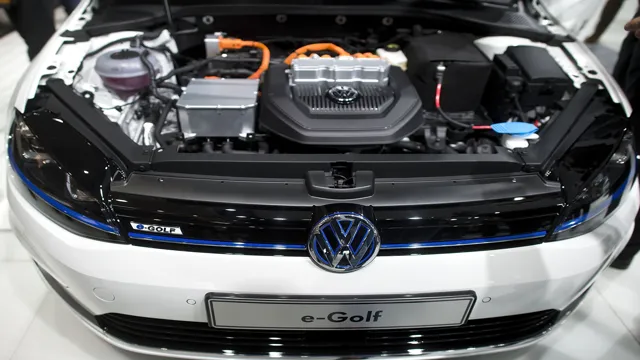Solve Your Way Through the Common Electric Car Firmware Problems with These Easy Fixes
Electric cars are becoming more common as the world shifts towards a greener future. They promise fewer emissions and lower operating costs – who wouldn’t want that? However, like any complex piece of technology, electric cars have their fair share of problems. One particular area that seems to cause headaches for owners and manufacturers alike is firmware.
Firmware is the software that controls the critical functions of the car, such as battery management, motor control, and even the dashboard. When a problem occurs with the firmware, it can be frustrating for both the driver and the manufacturer. In this blog, we’ll take a deeper look at the most common electric car firmware problems and explore the different fixes available.
Battery Management Systems
Electric car firmware problems can be a headache for drivers, especially if they affect the battery management system. One common problem is inaccurate battery range estimates, which can lead to range anxiety and unnecessary recharging. This can be caused by a variety of factors, such as outdated software or faulty sensors.
To fix the issue, it’s important to check for software updates and recalibrate sensors if necessary. Another issue is slow charging times, which can be frustrating for drivers on the go. This might be due to compatibility issues with the charger or a malfunctioning charging port.
To solve the problem, it’s recommended to try different chargers or consult with a professional electrician. Overall, being aware of these common electric car firmware problems and knowing how to fix them can help drivers feel more confident on the road with their electric vehicle.
Overheating
Overheating is a common issue that arises in batteries and can be detrimental to the performance of your electronic device. This is where battery management systems come into the picture. A battery management system (BMS) manages the battery’s charging and discharging process, prolongs battery life, and- most importantly, prevents it from overheating.
With BMS, the battery is prevented from overcharging and over-discharging, which are two primary reasons for overheating. The BMS maintains the optimal temperature and ensures that the battery neither gets too hot nor too cold. Overheating can cause the battery to swell, leak, or even explode, which can cause serious harm to you or the device.
So, if you want to prevent your battery from overheating, investing in a battery management system is a wise decision.

Undercharging
Battery Management Systems When it comes to managing batteries, one of the biggest concerns is undercharging. This can occur when a battery is not fully charged, leading to decreased performance and a shortened lifespan. That’s why battery management systems are so important, as they help ensure that batteries are charged to their full capacity and are kept in good condition.
These systems can monitor the charging process, detect when a battery is at risk of being undercharged, and prevent this from happening. By utilizing a battery management system, battery performance can be optimized and the lifespan of the battery can be extended. It’s crucial to invest in a reliable battery management system to ensure that your batteries are fully charged and in top condition.
Charging Delays
Battery Management Systems Have you ever experienced charging delays while using your electronic devices? It can be quite frustrating, especially when you’re on the go and need your device to be fully charged. This is where battery management systems come into play. Battery Management Systems (BMS) are essential in optimizing the performance of batteries and ensuring their durability.
BMS monitor the charge level and temperature of a battery, ensuring that it is charged to the desired level in the shortest possible time without overheating or overcharging. With a well-designed BMS, the overall charging time of a device can be significantly reduced, allowing you to use your device sooner. So, the next time you encounter charging delays, it might be worth considering if your device’s battery is managed by a reliable BMS.
Power Inverters
One common problem that electric car owners face is firmware issues. These issues can range from connectivity problems with charging stations to software malfunctions that affect the car’s performance. To fix these issues, it’s important to stay on top of firmware updates and ensure that your car’s software is always up to date.
If you’re experiencing connectivity issues with charging stations, try resetting your car’s software or contacting customer support for assistance. Other firmware issues may require a visit to a certified technician to diagnose and fix. It’s important to address these problems promptly to ensure that your electric car is running efficiently and safely.
By keeping up with firmware updates and addressing problems as they arise, electric car owners can avoid major issues down the line and keep their cars running smoothly.
Excessive Heat
When it comes to excessive heat, power inverters may be a savior for you. In hot temperatures, electronic devices are prone to malfunctioning, which can be a severe problem for anyone who depends on them. An inverter can convert DC power stored in your battery to AC power, ensuring your appliances can continue to function as usual.
However, it’s crucial to choose the right size of the power inverter since an insufficient inverter can’t handle the load from your devices, while an overly powerful one may overload and overheat. To ensure maximum effectiveness, it’s necessary to monitor the temperature of your inverter and its surroundings regularly. Keeping your inverter and its environment cool can prevent potential damages and prolong its lifespan.
When working correctly, a power inverter can save you from the headache of malfunctioning electronics and keep you worry-free even on hot days.
Power Drains
Power inverters are an excellent way to address power drains when you’re in need of a portable power source or backup power supply. These devices are designed to convert DC power from your car or battery into AC power that is suitable for powering your electronic devices. The beauty of power inverters is that they are incredibly versatile, and you can use them to power all kinds of devices while on the go, from laptops and smartphones to power tools and mini-fridges.
Power inverters come in various sizes, typically measured in watts, so it’s important to choose the right one for your needs. A high-capacity power inverter will offer more power but will also consume more battery power, which is something to keep in mind. It’s essential to choose a reliable brand and ensure that the power inverter is compatible with your vehicle or device to avoid damage or malfunction.
Software Updates
As electric cars become more popular, software updates have become a necessity. However, some updates can cause more problems than they solve. Common electric car firmware problems include issues with battery charging, connectivity, and even safety features.
For example, some Tesla owners have reported that updates have caused their vehicles to unexpectedly accelerate or brake. To fix these issues, it’s important to address them as soon as possible. Checking for software updates regularly and following manufacturer recommendations can prevent these problems from occurring in the first place.
Manufacturers also offer support and may be able to fix any problems remotely or at a dealership. Overall, while software updates are important, electric car owners should approach them with caution and act promptly if any issues arise.
Compatibility
When it comes to using software, compatibility is always a concern. With constant updates and new versions being released, it can be hard to keep track of which software will work together smoothly. Software updates can be particularly tricky, as they can cause compatibility issues with other programs.
However, keeping your software up-to-date is essential for staying secure and getting the best performance. It’s always a good idea to check compatibility before updating any software. This means checking that your current version of software is compatible with the latest update, and that any third-party programs or plugins you use are also compatible.
By doing this, you can ensure that your system runs smoothly and avoid any headaches caused by compatibility issues that could have been avoided.
Installation Errors
When it comes to installing software updates, it’s not uncommon to encounter errors. The most important thing to remember is to stay patient and try some basic troubleshooting steps before reaching out for additional support. Double-check that your device is connected to the internet, and ensure that you have enough storage space available for the update.
If you’re still experiencing issues, try restarting your device and attempting the update again. It’s also possible that there may be a known issue with the update, so be sure to check the software provider’s website or community forums for any known bugs or workarounds. By staying calm and taking these steps, you can increase your chances of successfully installing any necessary software updates and keeping your device running smoothly.
Conclusion and Future Solutions
In conclusion, just like any other piece of technology, electric cars can experience firmware problems that can cause frustration and inconvenience. However, armed with the right knowledge and resources, these problems are easily fixable. So, whether you’re experiencing software glitches, connectivity issues, or battery performance concerns, don’t despair.
Keep calm, troubleshoot, and before you know it, your electric ride will be running smoother than ever before. Happy driving!”
FAQs
What is a common firmware issue that electric car owners experience?
One common firmware issue is software bugs that can cause malfunctions in the car’s systems.
How can a firmware issue cause a decrease in driving range?
Firmware issues can cause the car’s battery management system to misread the battery’s level of charge, which can lead to a shorter driving range.
What can be done if the touchscreen interface stops working?
If the touchscreen interface stops working, resetting the infotainment system or updating the firmware can help resolve the issue.
What can cause issues with regenerative braking in electric cars?
Firmware problems can cause issues with regenerative braking, such as the car failing to slow down or stop when the brake pedal is depressed. Updating the firmware can help fix this issue.
Why might an electric car’s charging system suddenly stop working?
A firmware issue could cause the car’s charging system to shut down abruptly, preventing the battery from being charged. Updating the firmware can often help resolve this problem.


